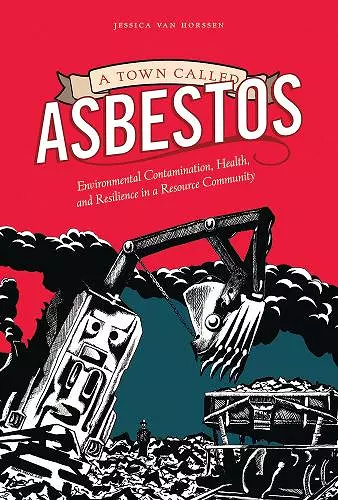A Town Called Asbestos
Environmental Contamination, Health, and Resilience in a Resource Community
Format:Hardback
Publisher:University of British Columbia Press
Published:15th Jan '16
Currently unavailable, and unfortunately no date known when it will be back
This hardback is available in another edition too:
- Paperback£31.00(9780774828420)

A mining town’s proud and painful history is unearthed to reveal the challenges a resource community faced in a globalized world.
In A Town Called Asbestos, a mining town’s proud and painful history is unearthed to reveal the challenges a small resource community faced in a globalized world.For decades, manufacturers from around the world relied on asbestos to produce a multitude of fire-retardant products. As use of the mineral became more widespread, medical professionals discovered it had harmful effects on human health. Mining and manufacturing companies downplayed the risks to workers and the general public, but eventually, as the devastating nature of asbestos-related deaths became common knowledge, the industry suffered terminal decline. A Town Called Asbestos looks at how the people of Asbestos, Quebec, worked and lived alongside the largest chrysotile asbestos mine in the world. Dependent on this deadly industry for their community’s survival, they developed a unique, place-based understanding of their local environment; the risks they faced living next to the giant opencast mine; and their place within the global resource trade. This book unearths the local-global tensions that defined Asbestos’s proud history and reveals the challenges similar resource communities have faced – and continue to face today.
A Town Called Asbestos is a crisp narrative that documents something close to manslaughter. If economic necessity saw mill employees literally work themselves to death, the recklessness of insurers and regulators remains inexplicable.
-- Holly Doan * Blacklock’s Reporter *For those interested in the history of Asbestos, Quebec, this is the book to read. Thoroughly researched in the archives -- its is, after all, based on a doctoral dissertation -- A Town Called Asbestos situates this particular town within a broader context of resource communities. It also raises some important questions, not only about the survival of communities reliant upon a single major employer but also regarding our federal government's willingness to use its positive international profile to market a hazardous product to developing nations. Read this book and feel the author's moral outrage. -- Ryan O'Connor, a writer, a historical consultant, and the author of the J.J. Talman Award-winning The First Green Wave: Pollution Probe and the Origins of Environmental Activism in Ontario (UBC Press) * Canada's History, Vol. 97 No. 1 *
...a fascinating and, at times, disturbing history of a Canadian mining industry’s incredible rise and devastating collapse. This history elucidates the complex relationships humans have with the physical (natural and industrial) environments around them and how individuals and communities create, nurture, and defend their sense of place...It is a vital contribution to our knowledge of Canadian natural resource industries and the people who made their collection possible. -- Elizabeth L. Jewett * American Review of Canadian Studies, Issue 46.4, December 2016 *
Painstakingly researched with a compelling writing style, A Town Called Asbestos fulfills the promise of recent U.S. environmental histories that integrated histories of labour, public health, and environmental change into a single narrative. It is essential reading for anyone interested in labour, industrial or environmental history, or any person who wants to know why a deadly substance may persist behind the walls where they live and work.
-- John Sandlos * Scientia Canadensis *In the middle of the environmental, medical, and political histories, van Horssen challenges and adds nuance to the existing historical narrative of the 1949 strike in Asbestos … She places it back within its local historical milieu showing how the strike arose in response to a confluence of grievances about local politics, health issues, and community relations.
-- Robynne Mellor, Georgetown University * Labour / Le TravaISBN: 9780774828413
Dimensions: unknown
Weight: unknown
256 pages